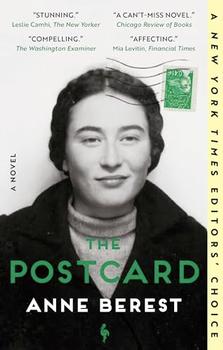Reading Guide Questions

Please be aware that this discussion guide will contain spoilers!
- French authors popularized what is known in the United States as autofiction, authors such as Amélie Nothomb, Emmanuel Carrère, Annie Ernaux, and now Anne Berest. The Postcard is largely true, yet it is still classified as a novel. Where do you think fact and family history end, and fiction begins in this book? How is it different from what readers typically expect from a memoir?
- Book 1 of The Postcard focuses largely on the lives of the Rabinovitch family before internment. As readers, we know what is coming, but Berest allows us to build relationships with these characters before tragedy strikes. How did thinking of these characters not just victims of unspeakable tragedy but as individuals who love, create art, write, and learn ask you to reflect on your own Holocaust education or how people who share a similar fate as that of the Rabinovitches are often portrayed on screen and in books?
- "On this particular night, all the young people her own age were on their way to the dance…The car's headlights lit up their legs and torsos, but not their faces" (pg. 139). In Book 1, and throughout the novel, Berest describes moments like this, moments that depict opportunities and experiences denied Jewish people during this time. Which descriptions of this kind stood out to you the most? How does evocative detail, description, and memorable images allow you feel more fully the betrayal and fear that her family experienced?
- "The ordeal to come would make a writer out of her, she mused. Yes–one day, she would write it all" (pg. 139). Noémie was a writer and her future was cut short. To what extent does The Postcard feel like a tribute to her? Does it feel as if Anne is writing to heal a sort of ancestral pain and sense of loss? Is there anyone from prior generations of your family who shares any of your talents of passions?
- In what ways do you witness family relationships shift throughout the novel? In what ways do they grow closer in the face of adversity? And when do they grow more distant?
- While presenting the 2023 Choix Goncourt prize in New York, Anne Berest delivered a very moving speech about preserving the voices of Holocaust witnesses, especially during a time when not many of them are still alive. What are some ways that we, as readers and literary citizens, can preserve their voices and stories to remember them as people, and not just as victims who lived through the Holocaust?
- The Postcard features a polyphony of voices: the voice of Anne, her mother Lélia, her family, her friends, the people who help her along the way. How did seeing The Postcard through the lens of multiple different perspectives shape your reading and tour relationship to the story and its principal characters?
- Anne Berest thinks of works of literature as "living memory." Do you think all works of literature, even ones less personal than The Postcard, become a living memory of something or someone?
- "I said I was Jewish–because I've heard you say it–and then my friend Assan said, 'That's too bad. I'm not going to pick you for my team anymore.' And I asked him why, and he said that his family didn't like Jews very much" (pg. 245). When Anne's daughter Clara experiences anti-Semitism at school, why doesn't Anne go immediately to the principal? What experiences from childhood influence her decision?
- "Her voice had changed, becoming higher, almost childlike, and I could see in her face the little girl she had been, seventy years earlier, eating strawberries from Emma's garden" (pg. 295). What role does memory serve in this novel? How about the practice of storytelling? How do the stories and remembrances that Anne & the other characters tell enrich your reading of the text?
- "It was because of Louise Bourgeois that Georges had chosen Bonnieux for my fortieth birthday celebration" (pg. 462), "Myriam spent the school holiday that summer painting still lifes–baskets of fruit, glasses of wine, and other meaningless objects" (pg. 93). What roles do art and artists play in this book? How do they serve as markers of place and time? Who are some of the writers and artists that Anne and Noémie, as creatives, found themselves inspired by? Do you believe that art has the power to heal?
- "I can see, in the constellation of fragments scattered over the page, a silhouette in which I recognize myself at last: I am the daughter, and the granddaughter, of survivors" (pg. 457). By the end of the novel, how has Anne's sense of her Jewish identity changed? In what ways is The Postcard a "quest novel"? What is the principal quest it describes?
Unless otherwise stated, this discussion guide is reprinted with the permission of Europa Editions.
Any page references refer to a USA edition of the book, usually the trade paperback version, and may vary in other editions.

 Book Reviewed by:
Book Reviewed by:





